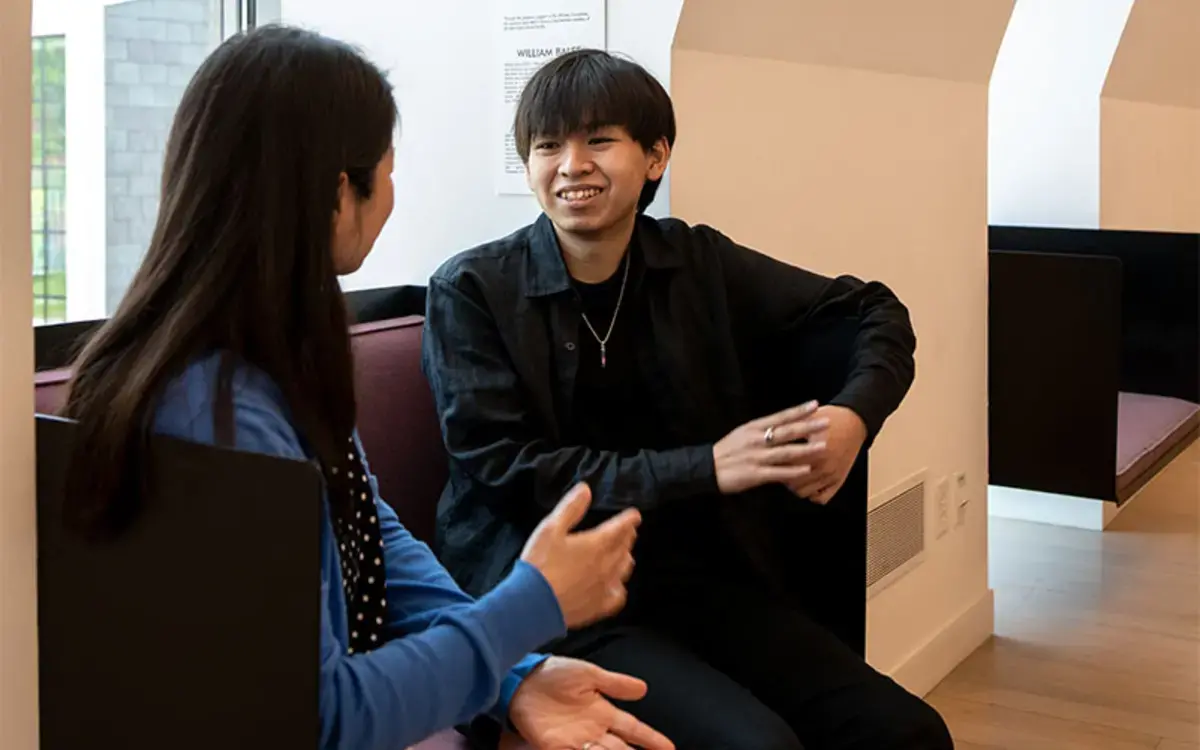A Career Head Start: Ryota Terashima ’24

On the afternoon before the international students’ farewell party and his departure for his home in the vast metropolis of Osaka in Japan, Ryota Terashima ’24 met us for an interview on the patio in front of Commons.
He is finishing two very valuable terms studying Social Sciences at Bennington as a part of an exchange with Kansai Gaidai University in Hirakata, Japan. The exchange was made possible through a decades-long effort by Ikuko Yoshida, Japanese language and culture faculty, pictured left in the photo above. Through this special exchange, focused on providing equal opportunities for all, Bennington students can apply the aid they receive to attend Bennington to expenses related to their education abroad.
Paradoxically, traveling far from home has been an unexpected shortcut to early professional advancement. He already has a job lined up for when he graduates from his Japanese university in March.
I have sort of mixed up feelings,” he says. “I will miss Bennington, especially for people and nature.
Terashima’s path to Bennington began with intense hard work. When he started University, he shared, he did not speak English.
“I was able to read and write and listen,” he explained. “But, normally, in Japan, you don’t have the opportunity to speak English.”
During the pandemic, when he began studying remotely, he took the time he had usually spent commuting to and from school, an hour each way, to complete online lessons in English.
“I just kept studying,” he says.
It was through that dedication that he was able to earn a scholarship to Bennington and study away. At Bennington, he found that it was easy to make connections with others. He appreciated the small classes. “We can have discussions,” he said.
Back in Japan, there are more than 100 students. We are just listening to the professor. It makes me sometimes sleepy and bored. Here, I think taking a class for around two hours feels really short to me.
A Head Start on the Job Search
Back in Japan, finding a job is typically a very long process. There are initial interviews, hiring interviews, and writing tests. Hiring companies look for students who have earned scholarships and studied subjects other than English at English-speaking colleges.
“Studying another subject in English makes me stand out,” he said.
In April, Terashima went to a job fair in Los Angeles, CA. After a few days meeting with representatives of Japanese companies and learning about job opportunities, he sent his resume to Tokyo-based Kyosan Electric Mfg. Co., Ltd. with his interest in international sales.
“One week after that, I got an email about an online interview,” Terashima said.
Because they had met him at the fair, he had received a scholarship to study social sciences in English at an English-speaking college, and he performed well in his studies in the U.S., he was able to forgo both the initial interviews and the writing test and go straight to the final interview. With the time difference between countries, Terashima took the interview at midnight in Commons. And he got the job. He will be working at the intersection of railways infrastructure manufacturing and international relations.
“Japan is very advanced in infrastructure stuff,” Terashima said. “So I want to contribute by exporting the technologies we have. I really want to make lives better, especially in developing countries.”
Gratified, Terashima said,
In the long run, studying abroad gave me more advantages. I feel like I don’t have to tell anything or I don’t have to tell much, because I am studying here. I am in Bennington. That is the evidence.
The experience also puts him ahead in terms of the responsibilities he will have. Typically, he explained, he would need to work for five years on domestic issues before being given assignments that address international business.
“I will be able to do international stuff directly,” Terashima said.
As much as he will miss Bennington, Terashima is looking forward to the comforts of home. He lists the authentic Japanese foods that are so difficult to find in rural New England: “our traditional Japanese barbecue, sushi, ramen noodles…”
With his upcoming career in international relations, he expects to be able to return to Bennington in the future.
“I’ll be back,” Terashima said. “I am so excited.”
Learn more about studying Society, Culture, and Thought at Bennington. For information about becoming a student at Bennington, visit bennington.edu/hyphenate.